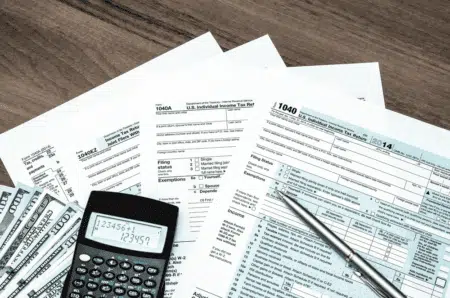IRS Audit Triggers to Avoid
How to Avoid the top IRS Audit Triggers?
What You Need to Know About IRS Audits?
The IRS audits less than 1% of individual tax returns each year. However, if the IRS selects you for an audit, it is important to know what to expect and how to respond. Here is what you need to know about IRS audits:
Types of IRS Audits
The IRS can conduct 4 types of audits: field, office, correspondence and TCMP.
IRS Correspondence Audit
The most common audit, correspondence audits, are the least thorough type of audit, and they are conducted via mail. This type of audit is generated when your tax return fails to match the information the IRS receives from reporting sources. With a correspondence audit, the IRS will most likely just send you a notice requesting payment of the understated income. If you errored and have additional information that could reduce what they are reporting, you must provide the IRS with this additional information or documents from the taxpayer. The taxpayer can respond to a correspondence audit by mail, and there is no in-person meeting with an IRS auditor. If the IRS is correct, write the check!
IRS Office Audit
Similarly, office audits are conducted at an IRS office and usually involve a review of the taxpayer’s records. The IRS auditor may ask for additional information or documents during an office audit. It is recommended that the taxpayer consult their accountant before going to this meeting.
IRS Field Audit
Field audits are the most thorough type of audit, usually at the taxpayer’s home or business. During a field audit, an IRS auditor will examine the taxpayer’s records and may even interview the taxpayer or witnesses. It is HIGHLY recommended that the taxpayer hire their accountant to deal with this audit.
Taxpayer Compliance Measurement Program Audit
This TCMP audit is an in-depth examination of ALL your financial records, including bank statements, contract documentation, invoices, and receipts from taxpayers. This process requires complete documentation proof of your tax return. It is HIGHLY RECOMMENDED that the taxpayer consult/hire a tax attorney to assist with this audit.
The Audit Process
The IRS will notify the taxpayer that they have been selected for an audit by mail. The notification will include information about the audit type being conducted and the records the taxpayer needs to provide.
The taxpayer will then meet with the IRS auditor to discuss the audit. During this meeting, the auditor will review the records and ask questions about the tax return. The taxpayer will have an opportunity to explain their position and provide additional documentation.
So after reviewing all of the financial information, the IRS auditor will make a determination about whether any changes need to be made to the tax return. If the auditor finds additional taxes, the taxpayer will get a notification of the amount he owes plus interest and penalties. However, the taxpayer can appeal the auditor’s decision if they disagree with it. Your fear might be heightened, knowing that the Inflation Reduction Act passed last year gives the IRS $80 billion in extra funds over 10 years, with a large chunk of that money to be used by the agency for increased enforcement activities. Most people can still breathe easily, however, because the vast majority of individual returns escape the audit machine.
Avoiding IRS Audit triggers
Taxpayers can do a few things to avoid an audit by the federal government. First, be sure to accurately report the amount of income on your tax return. Second, take advantage of all tax deductions and credits that you are eligible for but stay away from taking questionable deductions. Finally, keep good records of all income and expenses throughout the year. Avoiding common IRS audit triggers is your best way NOT to get audited.
While there is no guaranteed way to avoid being audited, following these tips can help reduce your chances of being selected.
One of the IRS audit triggers is claiming a home office deduction for personal use. To claim this deduction, you must use a portion of your home “regularly and exclusively” for business purposes, without any personal use. This deduction is generally limited to self-employed individuals and small businesses. However, with more people working from home due to the pandemic, some may try to stretch the definition of a home office, which could lead to an audit. It’s important to make sure that you meet all the requirements before claiming any deduction on your taxes to avoid any potential issues with the income tax. IRS Audit Triggers include excessive auto expenses and unnatural expenses for your income.
How To Address an IRS Audit?
Understand The Scope of the Tax Audit:
The first step in addressing an IRS tax audit is to understand the scope of the audit. The IRS will notify you in writing of the specific years or issues that are being audited. It is important to review this notice carefully so that you have a clear understanding of what the IRS is auditing.
Prepare Your Responses to IRS Questions:
Once you have a clear understanding of the scope of the audit, you will need to prepare your responses to questions from the IRS. This may include providing documentation to support your position. It is important to be honest, and straightforward in your responses.
- You should write your responses to the IRS for a mail audit.
- For an office or field audit, you will need to provide verbal responses to questions from the IRS auditor.
Cooperate With The IRS:
It is important to cooperate with the IRS throughout the audit process. This includes timely responding to requests for information and appearing for scheduled meetings.
Review The Proposed Changes:
Once the IRS has completed their audit, they will send you a proposed assessment of any taxes, interest, and penalties that you owe. So, it is important to review this proposed assessment carefully. You have the right to appeal the proposed changes if you do not agree with them.
Pay Any Taxes Owed:
If you agree with the proposed changes, you will need to pay any taxes owed. You can do this by sending a check or money order to the IRS. Be sure to include your social security number or tax ID number so that the payment is applied to the correct account.
You can contact the IRS to set up a payment plan if you cannot afford to pay the full amount owed.
File Your Tax Returns on Time:
It is important to file your tax returns on time, even if you are unable to pay the full amount of taxes owed. This will help to avoid penalties and interest charges. Most importantly, it will help to avoid an IRS tax audit in the future.
Small Business Tax Audit Triggers Owners Overlook:
Not Maintaining Detailed Records
One of the most common audits is about business expenses, including the mileage deduction and personal expenses. Proving your deductions becomes really important at this point. Excess deductions relating to your business type and income reported, including personal expenses, is one of the audit triggers. Failing to maintain meticulous records of your income and expenses, including personal expenses, puts you into a world of hurt. The IRS requires small businesses to keep accurate records of all financial transactions, including personal expenses, in order to report their taxes properly. The IRS may question your deductions and request proof of your deductions, including personal expenses.
Filing Incorrectly or Late
Filing late Another trigger for a small business tax audit is filing your taxes incorrectly or filing them late. The IRS has strict deadlines for filing your taxes, and if you miss the deadline or file your taxes improperly, you may be subject to an audit.
Claiming Ineligible Deductions or Tax Credits
One of the most common audit triggers is claiming ineligible deductions or taking tax credits you are not entitled to. The IRS has strict rules about what can and cannot be deducted, and if you claim deductions that are not allowed, you may trigger an audit.
Failing to Pay Estimated Taxes
If you are a small business owner, it is the requirement that you pay estimated taxes throughout the year. You may trigger an audit if you fail to pay your estimated taxes, including taxable income earned from a side hustle. For example, you may be subject to an audit if you are self-employed and don’t pay your estimated taxes on your side hustle earnings.
Not Reporting All Income
The biggest audit trigger is failing to report all of your income. The IRS requires you to report all income sources, whether from your business or from other sources. If you fail to report all of your income, the IRS may question your deductions and begin an audit.
Making Math Errors
One of the most common IRS audit triggers is making math errors on your tax return. The IRS will often catch these errors and will send you a notice asking for clarification. But, if you don’t respond to the notice or if you don’t have a valid explanation for the error, you may be subject to an audit. Understanding the most common IRS audit triggers, such as making math errors, can help you avoid an audit or at least resolve the situation as quickly as possible if you hear from the IRS.
Failing to Report Foreign Income
If you have income from foreign sources, including a foreign bank account, you have to report it on your tax return. The IRS has strict rules about foreign income, and if you fail to report it, you may trigger an audit. For example, failing to report foreign bank accounts and foreign assets can lead to both civil penalties and criminal prosecution. According to the Foreign Account Tax Compliance Act, you must report all foreign accounts with total cumulative balances that exceeded $10,000 at any point during the tax year, using FinCEN Form 114. This requirement is crucial to avoid any potential IRS audit and legal consequences related to undisclosed foreign income.
What to Do If You Receive an Audit Notice:
If you receive an audit notice from the IRS, don’t panic. The first thing you should do is review the notice carefully and make sure you understand what it is saying. If you have questions about the notice, you should contact your tax preparer or the IRS.
The next step is gathering all the documentation you will need to support your tax return. This may include receipts, bank statements, and records of your income and expenses. Once you have gathered all of the required documentation, you should contact the IRS to schedule an appointment.
The IRS will review your tax return at the appointment and ask questions about your deductions, income, and audit rate. It is important to be honest, forthcoming, and cooperate during the audit conducted by the Examination Division of the Internal Revenue Service. The IRS may adjust your tax return, but if they find that you have willfully misrepresented your taxes, you may be subject to penalties and interest charges.
If the IRS determines that you owe additional taxes, you will be responsible for paying the taxes plus any interest and penalties. The IRS will work with you to establish a payment plan if you are unable to pay the full amount due.
If the IRS determines that you are owed a refund, you will receive a check for the refund amount plus any interest owed.
What Should You Do If You Think You Will Be Audited?
If you think you may be subject to an audit, there are several things you can do to prepare. First, make sure you have all the documentation you need to support your tax return. This may include receipts, bank statements, and records of your income and expenses.
Next, review your tax return carefully during tax season and make sure there are no errors. The IRS will often catch errors and will send you a notice asking for clarification. However, if you don’t respond to the notice or if you don’t have a valid explanation for the error, there’s an excellent chance that you may be subject to an audit.
Finally, if you have income from foreign sources, make sure you report it on your tax return. The IRS has strict rules about foreign income, and if you fail to report it, you may trigger an audit.
The best way to avoid an audit is to be honest, accurate, and proactive in managing your tax liability on your tax return. If you are honest and accurate, you will have nothing to worry about if the IRS does choose to audit your return. However, if you are selected for an audit, don’t panic. The IRS will work with you to resolve the issue and help you reduce your tax liability. With the assistance of an experienced tax professional, you can audit-proof your tax returns. Knowing that you have taken steps to address any potential issues and minimize your tax liability, you can sleep well at night.
Conclusion
What are the IRS audit triggers for 2023?
The IRS audit triggers for 2023 would be determined by the IRS based on their policies and procedures at that time. It is always a good idea to stay informed about current tax laws and regulations. Consult with a tax professional, and ensure that you are accurately reporting your income and deductions to minimize the risk of being audited.
The best way to avoid an audit is the understand the IRS audit triggers. Be proactive and understand the triggers and take action to minimize these items. By understanding the triggers that may cause the IRS to take a closer look at your return, you can take steps to avoid them and potentially save a lot of money. Therefore, implementing these tips may help keep more of your hard-earned money in your pocket and out of the hands of the tax man. Have you ever had an IRS audit? What strategies did you use to try and avoid one?
Also Read
2. Tax Places



